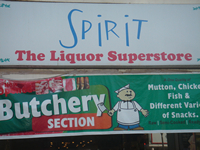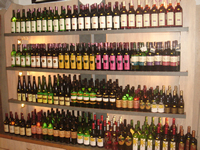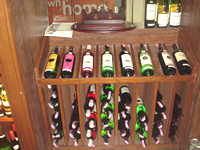| Chandigarh is the
most progressive city for wine marketing and availability,
finds Subhash Arora, editor of delWine during a recent visit
to the city. The local taxes on imported wines are reasonable,
storage is decent and availability easy.
Growing wine market: Chandigarh
is a Union Territory that is allowed by Article 47 of the

|
|
This store
actually sold the highest- about 1000, cases of
wine last year |
|
constitution to set its own wine marketing
policy, like other UTs and States. Four years ago it was
considered a backward wine city. But the pro active policies
of the progressive excise commissioners with a vision, and
the local government has made the city reach an annual sales
of 5000 cases, a jump of over 500% during the last four
years , according to locals.
The imported wine which was sold in insignificant
amounts in a couple of hotels then has almost 50% of share
of the total sales today.
One major factor of growth is the NRI links
of the city. About 40% residents have relatives who are
NRIs. Not only is there this floating population who likes
to drink wine, they also like to invest in ventures like
wine and liquor marketing, especially since the licensing
has become very liberal during the last couple of years.
Progressive sales, tax and excise
policy: The change can be attributed to the progressive
policies of Chandigarh which has consciously moved from
a policy of auctions and liquor cartelisation to freedom
in getting the license; a policy that encourages consumption
of lower alcohol beer and wines by keeping the excise duties
and VAT extremely low.
The VAT of 4% is the lowest in the country
and understandably the model policy is being passed on to
other states so they can also rationalise their policies.
Retail Licensing :
L-2 License: For
shops interested in retailing with Indian and imported liquor,
there is a fixed
 |
|
|
| Wine bottles may be tired standing
but are displayed tasteful and in right SPIRIT |
|
|
| |
|
|
annual License Fee of Rs. 25 lakhs (reduced
from the earlier Rs.40 lakhs) payable in advance. There
is a procedure and conditions laid down clearly by the administration
are to be followed.
Naming the store as ‘Wine Shop’
is passé. Spirits, World of Whiskey, Cheers, Tycoon
are some of the nouveau names of the shops which the private
stores have evolved whereas the traditional stores like
Empire Stores (they upgraded the earlier supermarket license
this year) are chugging along with their traditional name.
Tavern (Ahata) License:
L-2 license holders can get another license known as Ahata;
(name changed to the more modern ‘Tavern’ this
year) for an additional Rs. 1.0 lakh. Wine etc., purchased
in the shop can be consumed in this Tavern without paying
any extra amount. Limited snacks have to be offered at reasonable
prices to the customer. The design, colour schemes etc have
to be as per the specifications provided. So, one does not
have to go to expensive restaurants to consume alcoholic
beverages.
I was told that even women frequent some
of them in groups, where they can have their favourite tipple.
Chandigarh which encompasses the area within
a small radius of 12 kms. has about 150 shops with L-2 license
, 110 of which have the tavern license also. About 30-40
of the total licensees stock imported wines, making the
availability fairly easy.
License for Supermarkets:
(L-10B) Supermarkets and stores who sell only imported wine,
beer or liquor can pay an annual fees of Rs. 50,000. They
have to pay a nominal amount extra for each bottle purchased.
Currently, five stores have this license- MG, Punjab Stores,
Budhraja Stores and Peshawar Store(2).

|
|
|
Wine Cellar of Empire Store- Too
much light but a good start, nevertheless |
|
|
| |
|
|
Prices: The prices of imported wines are
cheapest you can find anywhere in India. Reason, the excise
and vend fees are very low. For L-2 license holders it is
less than Rs.10 a bottle (in Delhi it is Rs. 150 for the
same bottle. For supermarkets that sell imported liquor
and wine, an additional duty is chargeable at Rs.144 per
case, payable by the buyer. There is an import fee of Rs.4
per bulk liter for the producer which is built in the costing
per bottle.
The prices are not fixed and there is no
MRP for any wine. There is a lot of variation in prices
and discounts can be availed, if the quantities are big.
Prices on imported wines are much better than in Delhi.
Tarapaca Chardonnay (625), Hardys (625), Ruffino Chianti
(925) are relatively very good price, especially if you
know that 15% discount is available from Spirits on a case
(the owner told me for 20 cases he would give 20%-no wonder
he sold 1000 cases of wine last year!)
Many importers are now planning to enter
the market. Says Sanjeev Singh, MD of TT and G, importer
of Torres, whom I met in one of the shops, ‘We decided
not to enter the Delhi market. But we can compete very well
even with Indian wines in this market and are entering soon.
Paradoxically, Indian wines are too expensive.
Dindori which sells for Rs.700 (till a couple of months
ago selling for Rs.550/600) sells for Rs.860 in Chandigarh.
‘Grover’s lower end Sante sells for Rs.435 while
the comparable Madera from Sula sells for Rs. 290.
The customer needs to know the comparative
prices of various wines and negotiate when he can, if the
quantities are bigger.
Wine Storage: One has
heard a lot about the excellent storage and display of wines
in Chandigarh. Raman Nijhawan, the Area manager of Sula
for North, who had offered to take me around town even insisted
the storage was better than in Delhi.
If one were to compare the overall scenario,
I would definitely agree. All the shops and super markets
I visited were air-conditioned, unlike the majority in Delhi
and Mumbai.
But the best of them had something lacking-nothing
they cannot work on. Some stores had poor or insufficient
air conditioning while others had much too strong lighting
shining on the bottles. Some did have no prices mentioned
on the bottles while others had fine champagne like Veuve
Clicquot Ponsardin rolling between Deinhard Sekt (low end
German bubbly).
Four years ago when I had been invited
by the industrial Yasho Saboo who was opening a new luxury
watch store, Ethos in Chandigarh, I was impressed by the
guests who showed keen interest in drinking and learning
about wine. The then excise commissioner who had also been
a guest assured me that the coming policy would be quite
progressive.
 |
|
|
|
| Well stored, good display but very
expensively priced Indian wines |
|
|
|
| |
|
|
|
| |
|
|
|
Brand registration charges did come down
from April that year and every year has been better. At
present, registration charges are Rs.5000+1000 per label,
immaterial how much quantity is sold during the year following.
It is a policy that could be emulated by other states to
encourage availability and cheaper prices for softer alcoholic
beverages, especially wine which has additional advantage
of being healthy when drunk in moderation.
Chandigarh has the location advantage of
being a gateway to Punjab, Haryana and Himachal Pradesh
and perhaps meets some requirements of these regions thus
escalating sale of wine in the city.
Recommended stores:
Spirit: If you have bigger requirements,
you can get 15-20% discounts.
Empire Stores: Best stored wine
Avoid buying Indian wines unless
you are on a budget and want lower end wines. Better values
are available in imported wines. Shop for Indian wines in
Delhi. Check legality of bringing them back. You need to
sleep your wines for a few days after they travel.
For detailed text of the Excise policy
visit www.chandigarh.gov.in
|